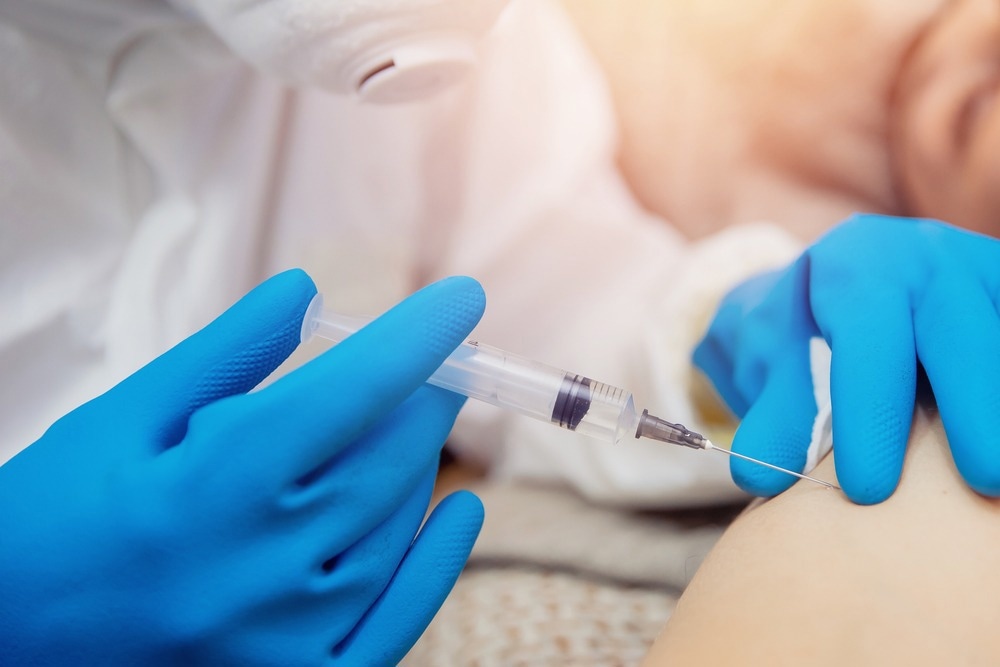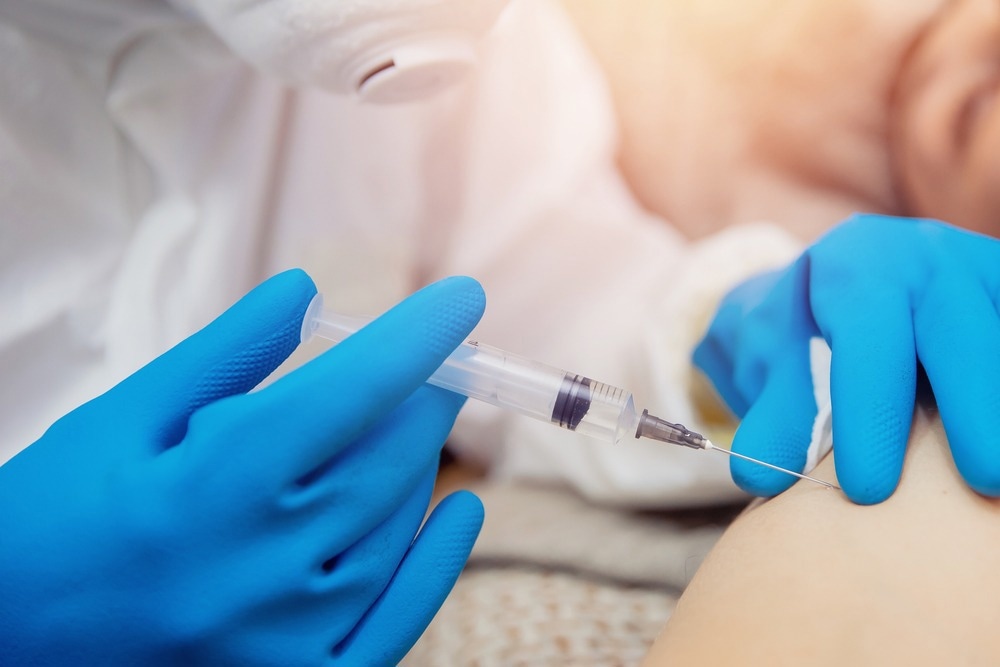In a recent study posted to Preprints with the Lancet*, researchers investigated the efficacy of a booster dose of the bivalent messenger ribonucleic acid (mRNA) coronavirus disease 2019 (COVID-19) vaccine in preventing severe outcomes during severe acute respiratory syndrome coronavirus 2 (SARS-CoV-2) infections.

Background
Antibodies eBook

While the early monovalent COVID-19 vaccines were highly effective in reducing the severity of SARS-CoV-2 infections, the emergence of the Omicron subvariants is challenging the efficacy of these vaccines.
The Omicron subvariants carry mutations that increase their ability to evade the immunity elicited by vaccines and previous SARS-CoV-2 infections. These mutations are largely in the spike-protein region, which is also the target for most neutralizing antibodies induced by the monovalent vaccines.
Recently developed bivalent mRNA vaccines contain mRNA sequences that code for components of the ancestral SARS-CoV-2 strain and one of the more recent Omicron subvariants, such as the BA.4/BA.5.
The United States (U.S.) Food and Drug Administration (FDA) approved the Pfizer-BioNTech and Moderna bivalent mRNA vaccines in late August 2022 as booster doses for adults with complete primary vaccinations. The approval was granted based on the efficacy of monovalent vaccines and the safety and immunogenicity of the bivalent vaccines.
Israel has approved the administration of booster doses of the bivalent vaccine for individuals at high risk of COVID-19, especially those above the age of 65. While some studies have examined the efficacy of the bivalent vaccines in preventing severe COVID-19 among hospitalized individuals, the effectiveness of these vaccines in preventing severe outcomes such as hospitalization and death among non-hospitalized individuals remains unclear.
About the study
In the present study, the researchers performed a retrospective cohort-based analysis of medical health records obtained from Clalit Health Services, which includes medical data on close to two-thirds of Israel’s population above the age of 65. The participants had been offered the Pfizer-BioNTech bivalent mRNA vaccine and were followed up for at least two weeks after vaccination.
The measured primary and secondary endpoints during the study were COVID-19-related hospitalization or death, respectively. Demographic information such as age, socio-economic status, etc., as well as data on the COVID-19 vaccination history, primary vaccination type, results from polymerase chain reaction (PCR) or antigen tests, hospitalization history, and death, were extracted from the medical records.
Additional information on COVID-19 risk factors such as asthma, chronic obstructive pulmonary disease, chronic kidney disease, chronic heart failure, diabetes mellitus, hypertension, lung cancer, ischemic heart disease, obesity, and smoking was also obtained.
The association between severe COVID-19 outcomes and booster doses of the bivalent vaccine was analyzed using a Cox proportional-hazards regression model while adjusting for comorbidities and demographic factors.
Results
The results reported that 14% (85,314) of 622,701 eligible participants received the bivalent mRNA booster dose. COVID-19-related hospitalization was necessary for only six of the bivalent vaccine recipients, compared to 297 who did not receive the booster dose of the bivalent vaccine and had to be hospitalized due to COVID-19. The incidence of death among the bivalent vaccine recipients was also significantly lower than those who did not receive the bivalent vaccine (one vs. 73).
Factors such as male sex and increasing age were associated with a higher risk of COVID-19-related hospitalization, and comorbidities such as chronic heart failure, chronic renal failure, history of cerebrovascular accident, and chronic obstructive pulmonary disease also increased the risk of hospitalization after SARS-CoV-2 infections. The risk factors for COVID-19-related death were similar except for the male sex, which was not linked to a high risk of COVID-19-related mortality.
Despite the effectiveness of the bivalent vaccine, its uptake as a booster dose was markedly low, with less than 14% of the eligible population availing of the vaccine. The authors believe that the low uptake rate could be due to misconceptions about the vaccine, such as side effects or misinformation that previous vaccine doses or SARS-CoV-2 infections are sufficient in protecting against future infections.
Conclusions
Overall, the results indicated that a booster dose of the bivalent mRNA vaccine significantly reduced the risk of COVID-19-associated hospitalization and death by 81% and 86%, respectively.
Amidst the rising number of breakthrough infections from emergent Omicron subvariants, these findings highlight the importance of making the bivalent vaccine available to those at high risk of COVID-19, such as the older section of the population and individuals with comorbidities.
*Important notice
Preprints with the Lancet publishes preliminary scientific reports that are not peer-reviewed and, therefore, should not be regarded as conclusive, guide clinical practice/health-related behavior, or treated as established information.
- Arbel, R. et al. (2022) "Effectiveness of the Bivalent mRNA Vaccine in Preventing Severe COVID-19 Outcomes: An Observational Cohort Study", Preprints with the Lancet. doi: 10.2139/ssrn.4314067. https://papers.ssrn.com/sol3/papers.cfm?abstract_id=4314067
Posted in: Medical Science News | Medical Research News | Disease/Infection News
Tags: Antibodies, Antigen, Asthma, Cancer, Chronic, Chronic Kidney Disease, Chronic Obstructive Pulmonary Disease, Coronavirus, Coronavirus Disease COVID-19, covid-19, Diabetes, Diabetes Mellitus, Efficacy, Food, Heart, Heart Disease, Heart Failure, immunity, Ischemic Heart Disease, Kidney, Kidney Disease, Lung Cancer, Mortality, Obesity, Omicron, Polymerase, Polymerase Chain Reaction, Protein, Renal Failure, Respiratory, Ribonucleic Acid, SARS, SARS-CoV-2, Severe Acute Respiratory, Severe Acute Respiratory Syndrome, Smoking, Syndrome, Vaccine
.jpg)
Written by
Dr. Chinta Sidharthan
Chinta Sidharthan is a writer based in Bangalore, India. Her academic background is in evolutionary biology and genetics, and she has extensive experience in scientific research, teaching, science writing, and herpetology. Chinta holds a Ph.D. in evolutionary biology from the Indian Institute of Science and is passionate about science education, writing, animals, wildlife, and conservation. For her doctoral research, she explored the origins and diversification of blindsnakes in India, as a part of which she did extensive fieldwork in the jungles of southern India. She has received the Canadian Governor General’s bronze medal and Bangalore University gold medal for academic excellence and published her research in high-impact journals.
Source: Read Full Article
